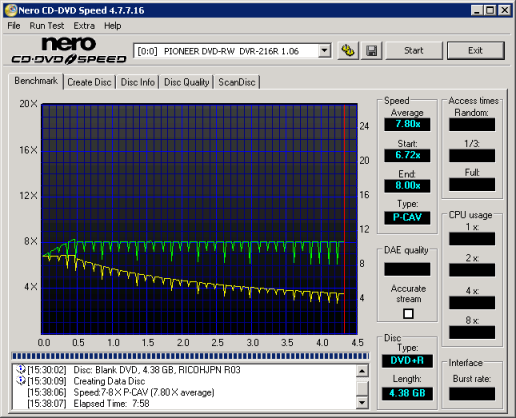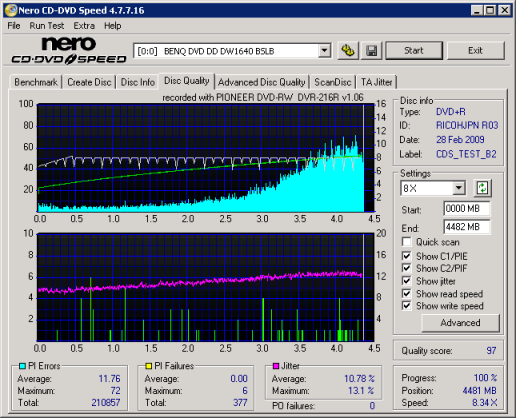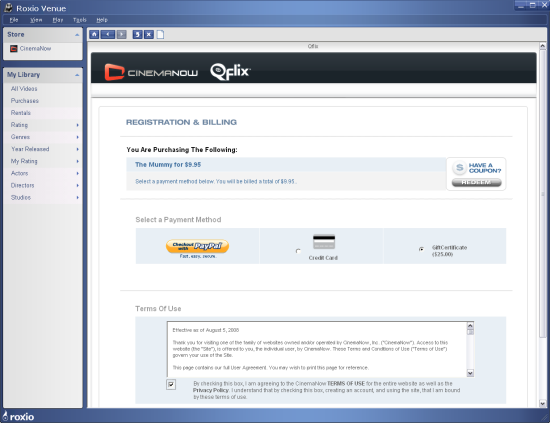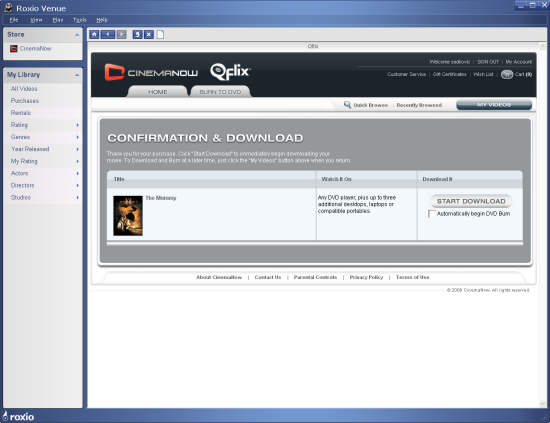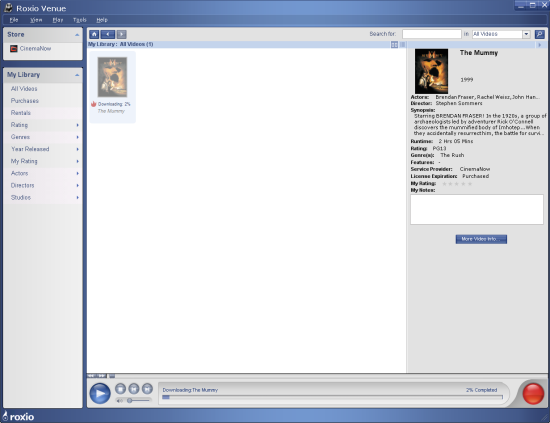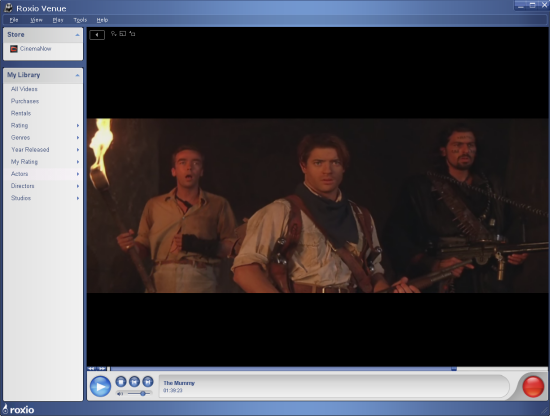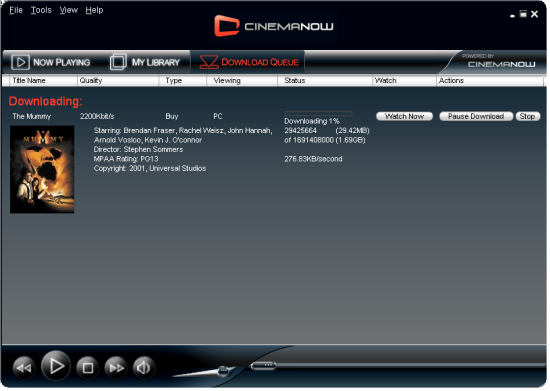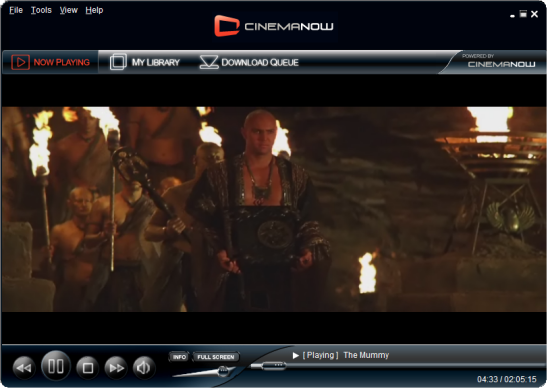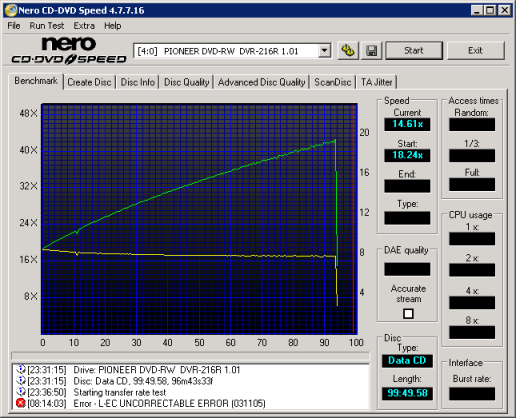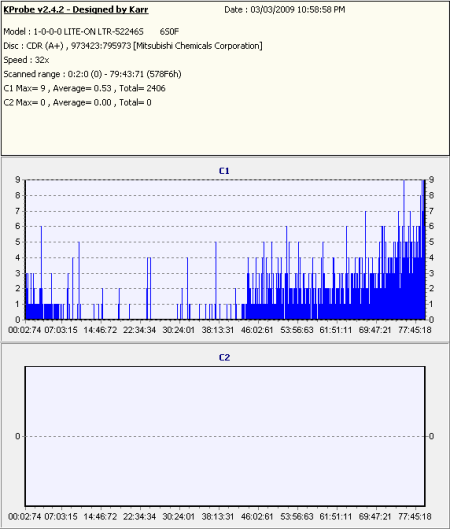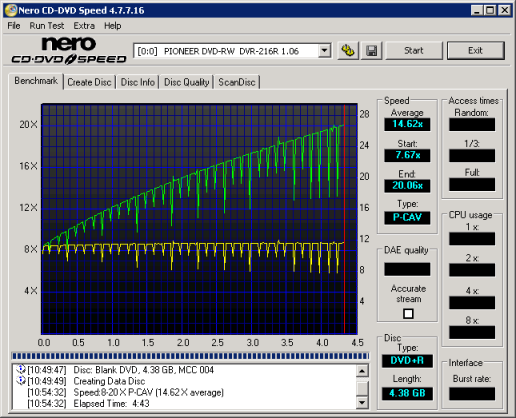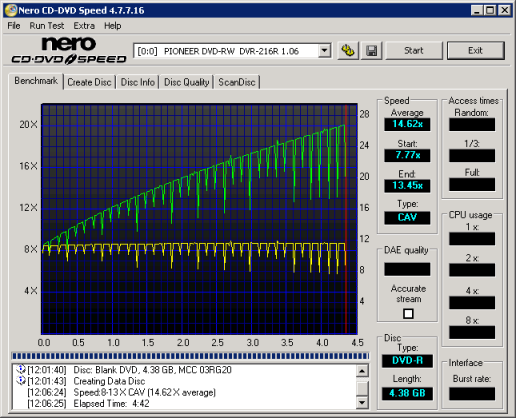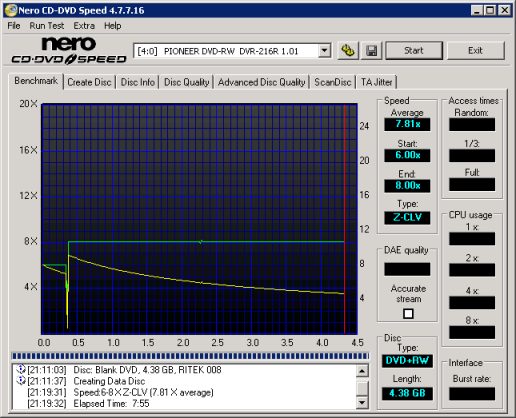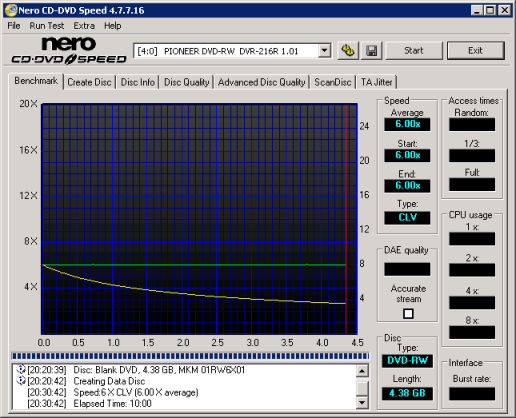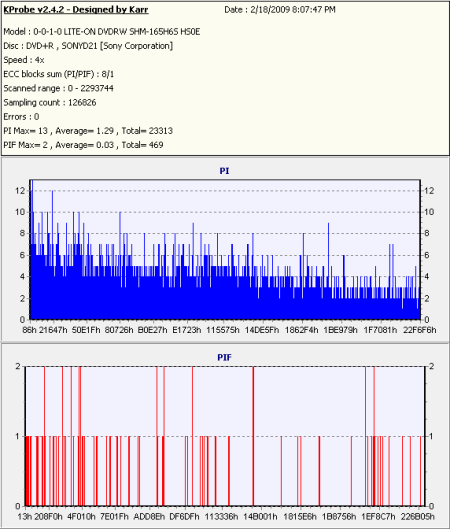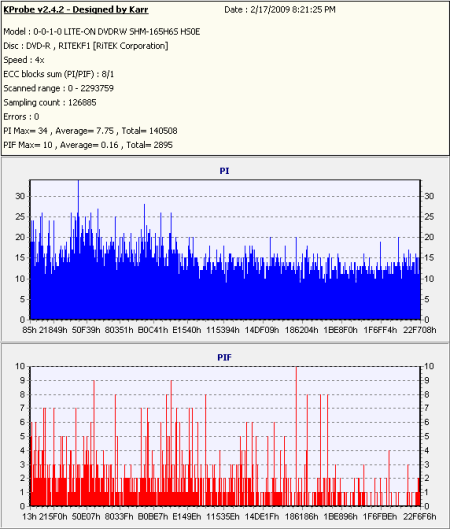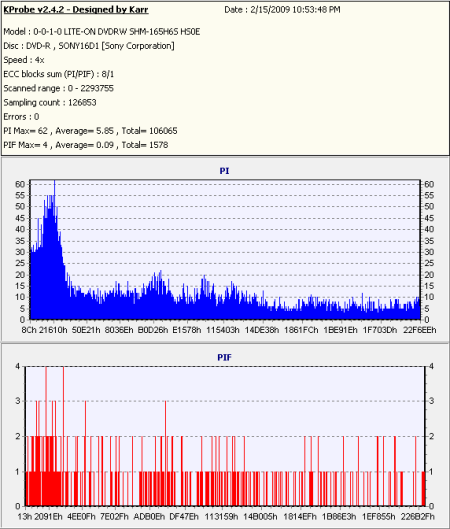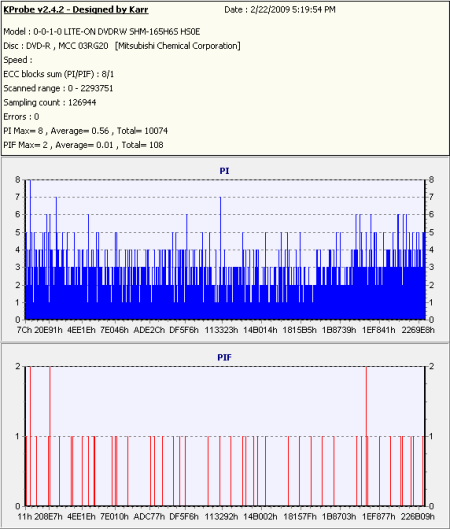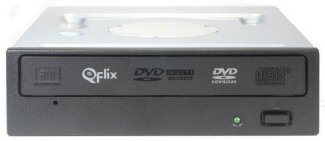

Model: Pioneer DVR-2920Q Qflix 20x DVD±RW/RAM
Manufacturer: Pioneer Electronics
As one of the biggest names in the consumer electronics industry, Pioneer doesn't need much of an introduction. For more than 50 years, this Japanese company has produced a wide range of audio and video products for the mobile, business and home markets. Pioneer is no stranger to the optical storage industry either. They've lead the way in this area, helping to develop and promote technologies like the DVD-R and DVD-RW formats and producing some of the world's best DVD writers.

This past fall, Pioneer introduced its first Qflix enabled DVD writers. With the internal DVR-2920Q and external DVR-X162Q, consumers can purchase and download movies from CinemaNow and then burn a permanent copy that can be played back on a standard DVD player. Along with support for Qflix, the two drives are capable of 20x DVD±R, 12x DVD±R DL, 12x DVD-RAM, 8x DVD+RW and 6x DVD-RW writing speeds and a maximum DVD read speed of 16x. The DVR-2920Q and DVR-X162Q also feature internal mechanisms to reduce noise and protect against dust as well as support for Pioneer's Optimum Write Speed technology. This new technology automatically adjusts the writing speed to deliver the best writing quality possible.
We've had the DVR-2920Q in the 'Labs for a few months now and have had the time to put it through its paces. To give you an idea of what to expect from Pioneer's new Qflix enabled DVD writer, we'll take a look at its features and then see how it compares to some of the 20x DVD±RW drives from the competition. Can the DVR-2920Q deliver the features and performance we've come to expect from Pioneer? Keep reading as we find out.
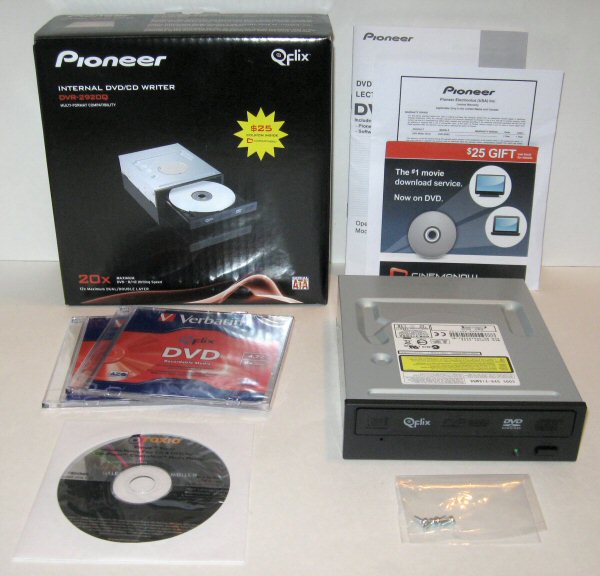
What's in the box?:
- Pioneer DVR-2920Q 20x DVD±RW/RAM Drive
- Software Installation CD
- Operating Instructions
- 2 Verbatim Qflix DVDs
- Warranty Information
- CinemaNow $25 Gift Certificate
- Mounting Screws
Physical Features:
The drive Pioneer sent us for this review was manufactured in August of 2008 and had firmware 1.01. For this review we used firmware versions 1.01 and 1.06.
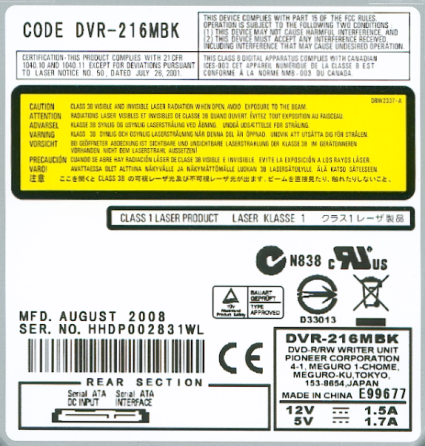
From the front, the DVR-2920Q looks very similar to Pioneer's previous DVD writers. It not only shares the same basic bezel design, but has many of the same logos. Along the front of the tray you can see a few showing support for the DVD+ReWritable, DVD Multi and DVD Download specifications, as well as Sonic's Qflix technology.

Below the tray you can see the DVR-2920Q's single LED. Off by default, this LED lights up green when the drive is reading or writing.
The rear of the DVR-2920Q is fairly straight forward. By looking at the picture below you can see the drive's SATA interface and power connector.

Technical Specs:
The specs below have been taken from Pioneer's website and the manual that came with the drive.
| Pioneer DVR-2920Q 20x DVD±RW/RAM | |
| CD Write Speeds | 40x (CAV) 32x, 24x (P-CAV) 16x, 10x, 4x (CLV) |
| CD Rewrite Speeds | 32x, 24x (Z-CLV) 16x, 10x, 4x (CLV) |
| DVD+R Write Speeds | 20x, 18x, 16x, 8x (CAV) 12x (P-CAV) 12x, 8x (Z-CLV) 6x, 4x, 2.4x (CLV) |
| DVD+RW Write Speeds | 8x (Z-CLV) 6x, 4x, 3.3x, 2.4x (CLV) |
| DVD-R Write Speeds | 20x, 18x, 16x, 8x (CAV) 12x (P-CAV) 12x, 8x (Z-CLV) 6x, 4x, 2x, 1x (CLV) |
| DVD-RW Write Speeds | 6x, 4x, 2x, 1x (CLV) |
| DVD+R DL Write Speeds | 12x, 10x, 8x (Z-CLV) 6x, 4x, 2.4x (CLV) |
| DVD-R DL Write Speeds | 12x, 10x, 8x (Z-CLV) 6x, 4x, 2x (CLV) |
| DVD-RAM Write Speeds | 12x (P-CAV) 5x, 3x, 2x (CLV) |
| DVD Read Speeds | 16x Max (DVD-ROM Single Layer) 12x Max (DVD-ROM Dual Layer) 16x Max (DVD±R) 13x Max (DVD±RW) 12x Max (DVD±R DL) 12x Max (DVD-RAM) |
| CD Read Speeds | 40x Max (CD-ROM/CD-R) 32x Max (CD-RW) |
| DAE Speed | 40x Max |
| Buffer Size | 2 MB |
| Random Access Times |
120 ms (CD) 130 ms (DVD) |
| CD Formats | CD-DA CD-ROM CD-ROM XA CD-R CD-RW CD-Extra (CD PLUS) Photo CD Video CD CD Text |
| DVD Formats | DVD-ROM DVD-R/RW DVD+R/RW DVD+R DL DVD-R DL DVD-RAM |
Optimal Write Speed:
The DVR-2920Q features Pioneer's new Optimal Write Speed technology. According to Pioneer, this function automatically adjusts the writing speed to deliver the best writing quality possible.
Optimal Write Speed is disabled by default on the DVR-2920Q. However, it can be enabled using the utility shown below. Using this utility, you can also check the status of the drive and save the optimal writing speed to the drive.
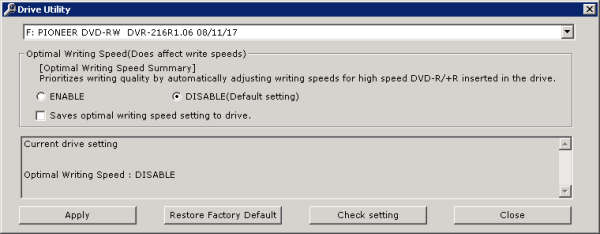
With Optimal Write Speed enabled, the DVR-2920Q wrote to Memorex's 16x DVD+R media at about 8x, taking nearly eight minutes to burn an entire disc. While this is about three minutes longer than it would take to burn a disc at 18x, the writing quality was considerably better than what we saw in our performance tests.
More Features:
By looking at the picture below, you can see that Pioneer's new DVD writer is identified as a "PIONEER DVD-RW DVR-216R."
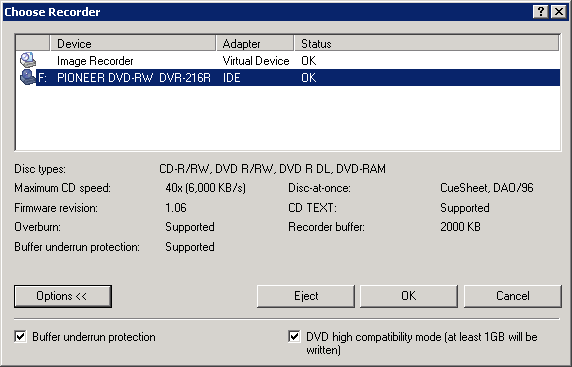
Nero shows that the DVR-2920Q has a maximum CD writing speed of 40x and a 2000KB buffer, which is backed up by some form of buffer underrun protection. According to Nero, the drive can also write CD-Text and overburn. When testing the drive's capacity I found that the drive was able to overburn up to 94:27 with CompUSA's 99 minute CD-R media.
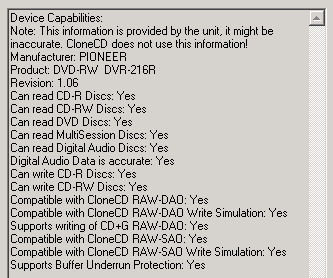
Using Alex Noe's Weak Sector Utility I was able to determine that the DVR-2920Q is a "two sheep" burner. This means that Pioneer's new drive is capable of backing up titles protected by SafeDisc 2, including version 2.51.
Here is a screen shot from Nero's InfoTool. This program queries the drive to see what its reading and writing capabilities are. InfoTool had no problems detecting the DVR-2920Q's maximum reading and writing speeds, recording modes, buffer underrun protection and 2MB buffer.
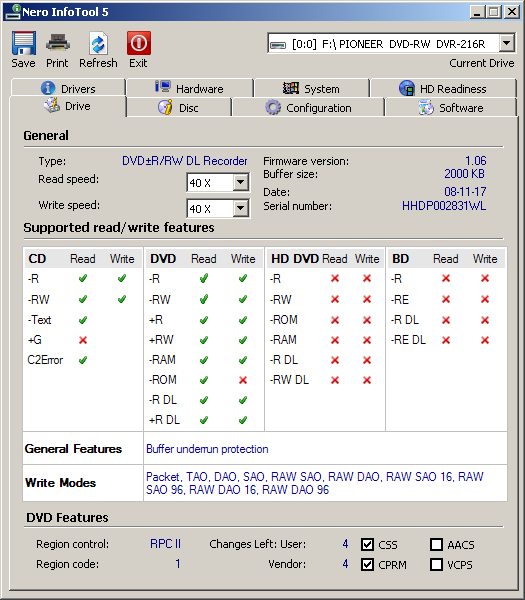
InfoTool also shows that the DVR-2920Q is an RPC-2 DVD drive. This means that the drive's region is stored in the firmware. The region can be changed five times and after that it cannot be changed anymore. While there isn't an RPC-1 firmware available for the drive, there is a utility available that can make the drive region free.

While InfoTool gives us a quick glance at the DVR-2920Q's features, DVDINFOpro provides a little more information on some of the drive's reading and writing capabilities. By looking at the screenshot above you can see that Pioneer's new drive can read and write to most DVD formats and offers support for Qflix and DVD Download recording.

The DVR-2920Q doesn't let you set the book type of single layer DVD+R or DVD+RW media. However, the drive automatically sets the book type for DVD+R DL discs to "DVD-ROM". This greatly reduces compatibility problems, especially with older DVD players.
The DVR-2920Q is one of the first drives to offer support for Sonic Solution’s Qflix technology. This implementation of the DVD-Download specification gives consumers the ability to purchase movies and TV shows online and download them to their computers. Using a drive like the DVR-2920Q, they can then be burned to DVD using special Qflix media. These discs use the same copy protection (CSS) found on commercially released DVDs and can be played back on most standard DVD and Blu-ray Disc players.
To do all of this, you will need to use Roxio Venue, which comes bundled with the DVR-2920Q. This software lets you connect directly to CinemaNow and navigate through its catalog of Qflix titles. The main page lists the six newest releases. Otherwise, if you're looking for an older movie, you can browse by genre (Comedy, Drama, Action, Thriller, Family). Clicking on a movie will bring up additional information such as the director and starring actors as well as a brief synopsis.
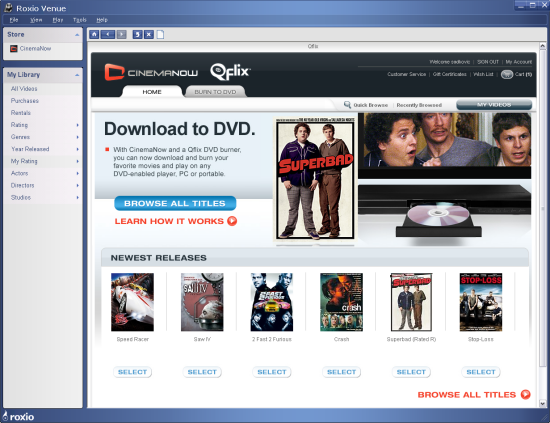
While CinemaNow has thousands of movies for sale through its main website, only a handful of them can be downloaded and burned to DVD. Prices also range from $7.99 for an older, catalog title to $19.99 for a new release.
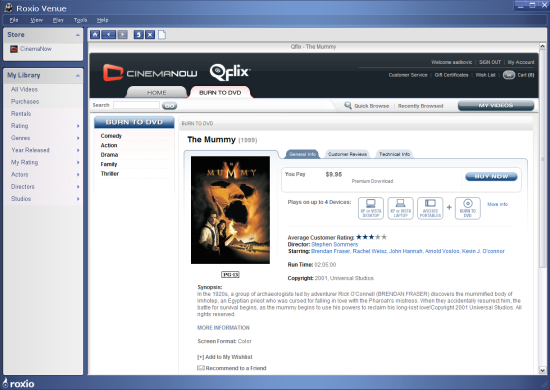
To test the Qflix capabilities of the DVR-2920Q, I purchased The Mummy. Along with being able to download and burn this movie to DVD, CinemaNow's license lets me play it on up to four desktops, laptops or compatible portable devices. Once I logged in and selected a payment method (PayPal, credit card or gift certificate), I was able to begin the download process.
The amount of time it takes to download the movie will vary depending on your internet connection. In my case, it took about 1:45 to download The Mummy over my 3Mb DSL connection. The movie is 2:05 in length and the downloaded file was about 1.69GB in size. One nice thing with Venue is that you can watch the movie on the computer while it is downloading. This way you don't have to wait for the entire movie to download before you can watch it.
Venue also has the ability to burn your movies to DVD. To save time, you can automate the process by telling Venue to start burning the DVD before the movie has finished downloading. Otherwise, you can burn it manually once the download is complete.
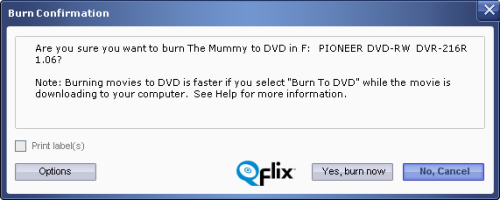
Burning it manually can take a considerable amount of time. With The Mummy, it took Venue nearly three hours to prepare the movie and burn it to RiDATA's Qflix DVD media. Needless to say, you'll want to take Venue's recommendation and start burning the DVD while the movie is still downloading.
As promised, the Qflix DVD burned by Venue played fine in my Lite-On DVD recorder and Playstation 3. While lacking a menu or any sort of extras, there were chapter marks every five minutes.
The DVR-2920Q also comes with the CinemaNow Media Manager. While lacking Venue's burning capabilities, CinemaNow Media Manager can be used to mange your video library and download queue as well as play movies purchased or rented from CinemaNow.
For the DVR-2920Q's software bundle, Pioneer has turned to Roxio. Along with the aforementioned Venue and CinemaNow software, the CD contains Roxio Central, BackOnTrack, CinePlayer and Easy CD & DVD Burning which includes Creator Classic, Music Disc Creator and PhotoSuite.
Roxio Central gives users access to all of the applications in the Venue suite. From the main menu, they can create their own CD's and DVD's, make copies of existing discs, backup their computer and organize their photos, videos and music.
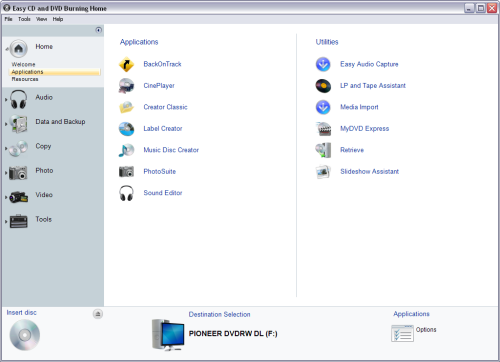
The suite also includes what Roxio calls "Creator Classic" and "Music Disc Creator". While not as robust as disc mastering applications like Nero, these two programs will have you creating your own custom data and audio discs in no time.
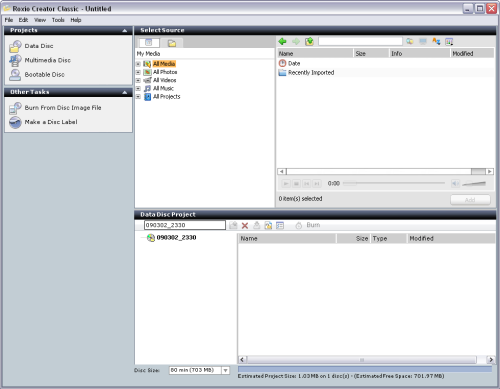
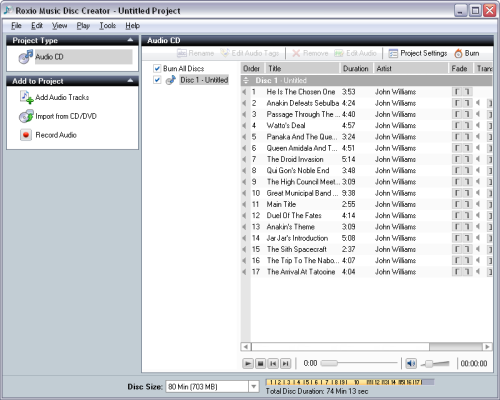
Roxio's PhotoSuite software gives you the ability to repair, enhance and share your digital photos. It also includes a number of automated and advanced photo editing tools that will let you easily crop and rotate your pictures, remove things like red-eye and add text and special effects.

The suite also includes Roxio's backup software, BackOnTrack. This easy to use program lets you backup your files to CD, DVD or another hard drive. Backup jobs can be launched manually or scheduled to run at regular intervals so the data is always protected. BackOnTrack also supports compression and encryption and can instantly restore your system to a previous state.

Last but not least, you have Sonic's DVD playback software, CinePlayer. Along with DVD movies, CinePlayer can be used to play back your VCD's, SVCD's or whatever video files you might have on your hard drive.

With the DVR-2920Q, Pioneer has delivered one of their most feature packed DVD writers to date. This Serial ATA equipped "Super Multi" drive not only supports all major DVD formats, it offers some pretty impressive specs. The DVR-2920Q is capable of 20x DVD±R, 12x DVD±R DL, 12x DVD-RAM, 8x DVD+RW and 6x DVD-RW writing speeds and a maximum DVD read speed of 16x. Along with support for Qflix, the DVR-2920Q includes features like a 2MB buffer, noise reducing mechanisms and Pioneer's Optimal Write Speed technology. Unfortunately, it lacks bitsetting support for single layer DVD+R and DVD+RW media. Even then, the Pioneer DVR-2920Q scores a solid 8 out of 10 for its features.
Along with smaller cable size, one of the biggest benefits of Serial ATA is its ease of installation. Because it uses a point to point connection, setting jumpers has become a thing of the past. In most cases, installation is as simple as plugging in the SATA and power cables and turning the computer on. Needless to say, it took only a couple of minutes to install Pioneer's new DVD writer in our test computer. After making sure that the DVR-2929Q was recognized by Windows, I was ready to start installing the software.
Software Installation:
As I mentioned earlier, the DVR-2920Q comes with a CD full of software from Roxio and CinemaNow. If you have autorun enabled on your computer, the setup program will automatically launch when you insert the disc.
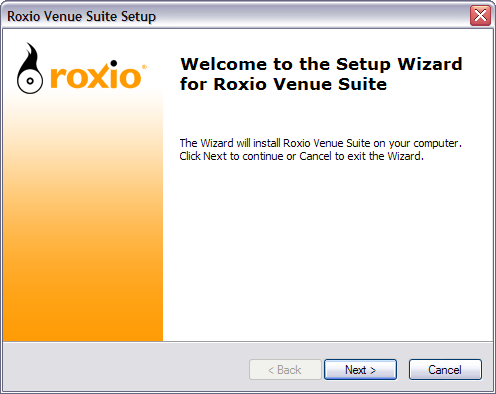
Installing the software is pretty straightfwoard. All you need to do is accept to the license agreement, enter your customer information and select your installation options. By default the setup program will install the entire suite onto your computer. If you don't want to install everything, select the custom installation. From here you can choose just the components you want.
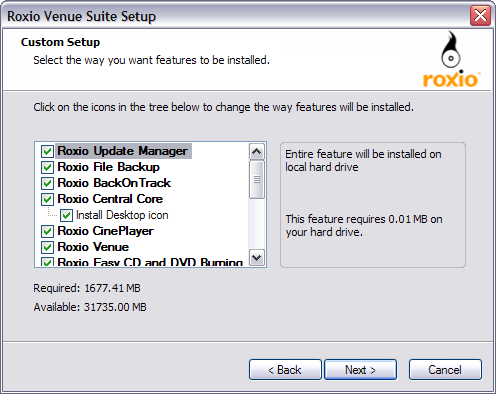
Documentation:
The DVR-2920Q comes with a set of "Operating Instructions." While not very large, this manual is well laid out and contains a fair amount of useful information. It starts out by going over the features of the DVR-2920Q. This includes an extensive list of specs as well as a few diagrams showing all of the buttons and connectors on the front and back of the drive. Pioneer has done a great job here as everything is labeled clearly and the functions of each are explained very well.
From there, the manual jumps right into the physical installation of the drive. Unfortunately, this section is very brief and consists mainly of some written instructions describing how to install the drive in your computer and connect the cables. The manual finishes up with some information on the DVR-2920Q's Optimal Write Speed feature as well as a short troubleshooting section that explains how to manually eject a disc from the drive.
Like Pioneer's previous DVD writers, the DVR-2020Q was very easy to install. I had no problems getting the drive or the software installed and working. The documentation included with the drive is brief, but should be enough to get the drive up and running. Nevertheless, I would have liked to have seen some better installation instructions as well as some information on Qflix. With this in mind, the DVR-116D gets an 8 out of a possible 10 for this section of the review.
While CPU, memory, OS and other variables don't often make a huge difference, there are some nonetheless. We have a computer that is used only for testing hardware. We do this so all tests can be compared reliably.
Test System:
| CPU: | AMD Athlon 64 X2 4600+ 2.4GHz | |
| Motherboard: | ASUS M2N-SLI Deluxe with BIOS 0304 | |
| Memory: | Corsair TWIN2X2048-6400 | |
| Video Card: | MSI NX7900GT-T2D256E - ForceWare v93.71 | |
| Hard Drive: | Seagate Barracuda 7200.10 SATA 3.0Gb/s 320GB | |
| Operating System: | Windows XP SP2 - NVIDIA nForce v9.16 |
For DVD writers the performance tests are broken down into four sections: CD read, CD write, DVD read and DVD write tests. Each benchmark test has been run three times. The score given is an average of the three. DMA has been enabled in device manager for all IDE devices supporting it.
CD Read Tests: For the read performance section of the CD-ROM benchmarks, CD WinBench 99 and CD Speed are used to test transfer speeds, seek times and CPU usage. For DAE testing, CD Speed is used to give an overall speed rating and is used in combination with CD DAE to see how well a drive reads scratched and dirty discs.
CD Write Tests: To test the write speeds, Nero Burning Rom is used to write 700MB to our test media. Times are recorded. To test rewrite scores, Nero is used again to time how long it takes to write 400MB of random files and directories. Then Sonic's DLA is used to test packet writing speeds. The same files are copied and pasted in Windows Explorer and timed.
DVD Read Tests: For the read performance section of the DVD benchmarks, CD Speed is used to test read speeds, seek times, and CPU usage.
DVD Write Tests: To test the DVD write speeds, Nero Burning Rom is used to write 4GB to our test media. Times are recorded. Then Sonic's DLA is used to test packet writing speeds. The same files are copied and pasted in Windows Explorer and timed.
CD Winbench 99 Scores:
| Pioneer DVR-2920Q |
Pioneer DVR-116D |
Optiarc AD-7200S |
Samsung SH-S203N |
|
| CD Winbench 99 | 1875 KB/sec | 1880 KB/sec | 1695 KB/sec | 2140 KB/sec |
| Transfer Rate: Inside | 2140 KB/sec | 2140 KB/sec | 2800 KB/sec | 3040 KB/sec |
| Transfer Rate: Outside | 5720 KB/sec | 5730 KB/sec | 6370 KB/sec | 6450 KB/sec |
| Random Access Time | 104ms | 103ms | 130ms | 96ms |
| CPU Utilization | 2.15% | 1.83% | 2.22% | 3.12% |
The CD Winbench test is as close as we can get to testing every day usage. It fires off eight different applications using scripts. This tries to mimic the activities of a person loading these programs onto their own computer.
Pioneer's new DVD writer gave us some mixed performance in our CD Winbench tests. In the transfer speed tests, the drive started reading at 14.3x (2140 / 150) and reached a maximum speed of about 38.1x (5720 / 150) on the outside. While this is fairly good for a drive with a maximum read speed of 40x, the DVR-2020Q's overall score was not as high as some of the other DVD writers we've looked at.
CD Speed v4.7.7.7 - Pressed CD:
For this test I used a pressed CD containing one Mode 1 data track. The disc is 74:38 in size and is full of data and directories.
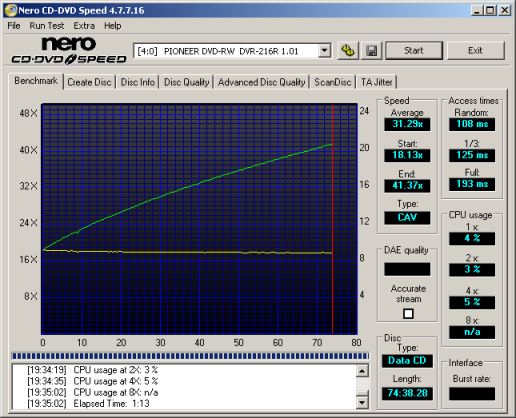
| Pioneer DVR-2920Q |
Pioneer DVR-116D |
Optiarc AD-7200S |
Samsung SH-S203N |
|
| Transfer Speed Average: Start: End: |
31.29x 18.13x 41.37x |
31.31x 18.09x 41.43x |
35.50x 20.41x 46.96x |
35.96x 20.75x 47.55x |
| Seek Times Random: 1/3: Full: |
109ms 126ms 193ms |
108ms 128ms 197ms |
143ms 157ms 236ms |
102ms 105ms 177ms |
| CPU Usage 1x: 2x: 4x: 8x: |
4% 3% 5% n/a |
4% 4% 6% n/a |
16% 1% 2% 4% |
0% 1% 2% 4% |
The DVR-2020Q performed a little better in our CD Speed tests. While still not as fast as the drives from Optiarc and Samsung, it had no problems reaching a maximum speed of 41.37x.
CD Speed v4.7.7.7 - CD-R Media:
For this test I made a copy of our pressed test CD. I used 12x rated Memorex Gold 74 minute media for the tests.
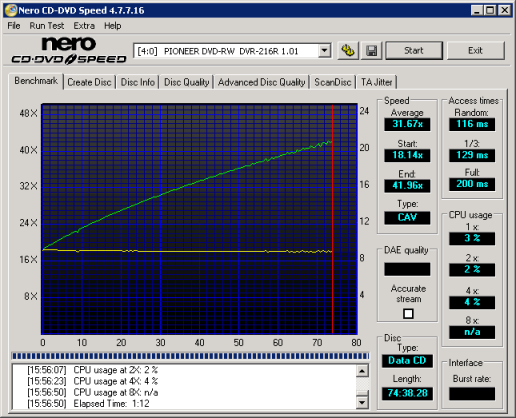
| Pioneer DVR-2920Q |
Pioneer DVR-116D |
Optiarc AD-7200S |
Samsung SH-S203N |
|
| Transfer Speed Average: Start: End: |
31.67x 18.14x 41.96x |
31.69x 18.16x 41.76x |
36.25x 20.62x 48.01x |
31.30x 17.98x 41.48x |
| Seek Times Random: 1/3: Full: |
116ms 130ms 201ms |
116ms 129ms 207ms |
143ms 169ms 243ms |
96ms 104ms 174ms |
| CPU Usage 1x: 2x: 4x: 8x: |
3% 2% 4% n/a |
3% 2% 6% n/a |
16% 1% 2% 4% |
0% 1% 2% 5% |
The DVR-2020Q was a little faster when reading CD-R media. While this still wasn't enough to top the drives from Optiarc and Samsung, it reached a maximum read speed of 41.96x.
Unfortunately, Pioneer's new drive had some trouble reading our 99 minute CompUSA media. While the DVR-2020Q was able to recognize the disc correctly, it would not read beyond the 94 minute mark.
CD Speed v4.7.7.7 - CD-RW Media:
For this test I made a copy of a pressed test CD. I used some PNY 80 minute CD-RW media for the tests.
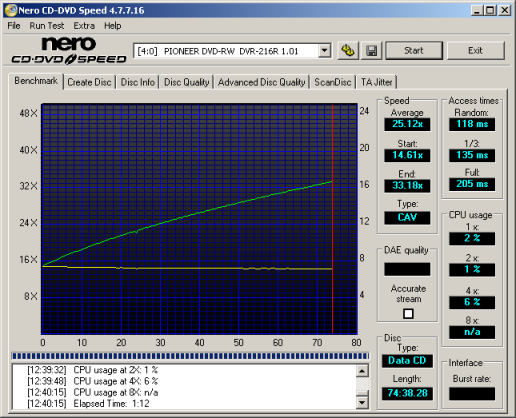
| Pioneer DVR-2920Q |
Pioneer DVR-116D |
Optiarc AD-7200S |
Samsung SH-S203N |
|
| Transfer Speed Average: Start: End: |
25.12x 14.61x 33.18x |
25.14x 14.62x 33.21x |
30.71x 17.71x 40.00x |
30.74x 17.86x 40.60x |
| Seek Times Random: 1/3: Full: |
117ms 134ms 203ms |
116ms 128ms 199ms |
144ms 155ms 239ms |
97ms 106ms 176ms |
| CPU Usage 1x: 2x: 4x: 8x: |
2% 1% 6% n/a |
1% 2% 5% n/a |
8% 1% 2% 3% |
0% 1% 2% 5% |
When reading CD-RW media, the DVR-2020Q's transfer speeds are limited to only 32x. While Pioneer's new writer had no problems reaching this speed in our tests, it was still the slowest out of the four drives here.
CD DAE and CD Speed v4.7.7.7 (DAE) - Pressed CD:
For this test I used Pure Funk. The CD is almost exactly 74 minutes. This helps to squeeze the maximum performance out of the CD.

Exact Audio Copy can tell us a lot about a drive's capabilities. You can see from the screen shot that while the Pioneer DVR-2920Q supports accurate stream, caches audio data and has the ability to retrieve C2 error information from audio CD's.
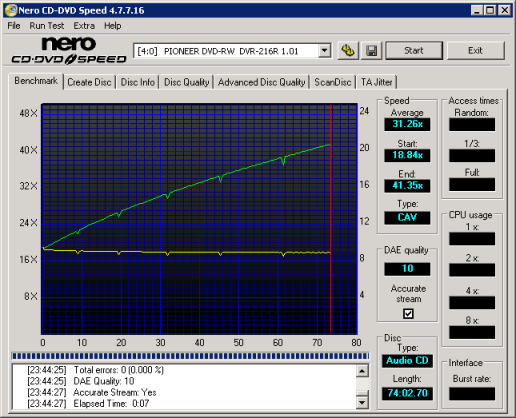
| CD Speed | Pioneer DVR-2920Q |
Pioneer DVR-116D |
Optiarc AD-7200S |
Samsung SH-S203N |
| Average: Start: End: DAE Quality: Accurate Stream: |
31.26x 18.84x 41.35x 10 Yes |
31.29x 18.85x 41.40x 10 Yes |
30.89x 17.71x 40.00x 10 Yes |
30.93x 17.76x 40.86x 10 Yes |
The DVR-2020Q did fairly well in our DAE tests. While not nearly as fast as some of the other DVD writers we've tested, it had no problems ripping pressed audio CD's at 41x.
CD DAE and CD Speed v4.7.7.7 (DAE) - CD-R Media:
For this test I used a copy of the Pure Funk CD. It's burned onto the same Memorex Gold 74 minute media I used in the CD Speed tests.
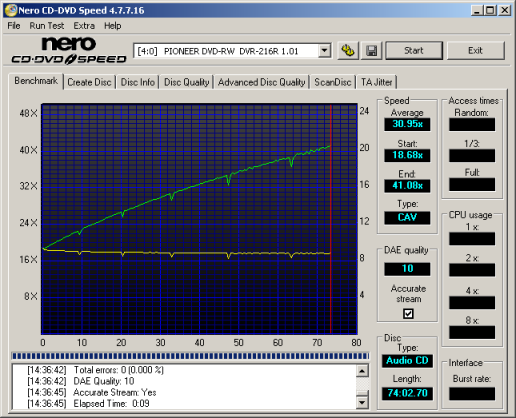
| CD Speed | Pioneer DVR-2920Q |
Pioneer DVR-116D |
Optiarc AD-7200S |
Samsung SH-S203N |
| Average: Start: End: DAE Quality: Accurate Stream: |
30.95x 18.68x 41.08x 10 Yes |
30.99x 18.85x 41.06x 10 Yes |
30.62x 17.69x 40.01x 10 Yes |
30.64x 17.74x 40.40x 10 Yes |
While the DVR-2020Q was a little slower when extracting audio from CD-R media, this didn't keep it from reaching a maximum DAE speed of 41x. So how did it do in CD Speed's advanced DAE tests? Take a look below.
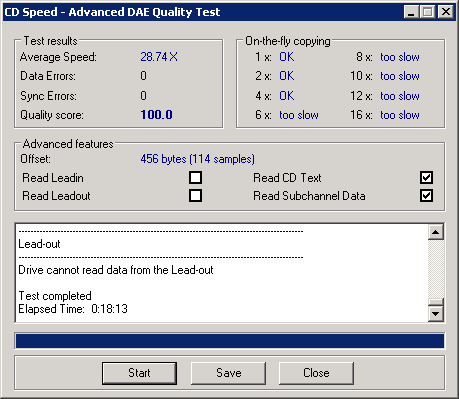
Pioneer's DVD writer completed CD Speed's advanced DAE tests with an average score of 28.74x. While the drive went through all of the tests without creating any errors, it was unable to pass all of the on the fly copying tests. If you look at the advanced features, you can see that the DVR-2020Q was able to read the CD-Text and subchannel data but failed to read the lead in and lead out sections of the CD.
To see how well the DVR-2020Q can read scratched and dirty discs, I used CD Speed's ScanDisc utility to see how many sectors were damaged or unreadable. This is a very rough, but good way to test the drive's error correcting abilities.
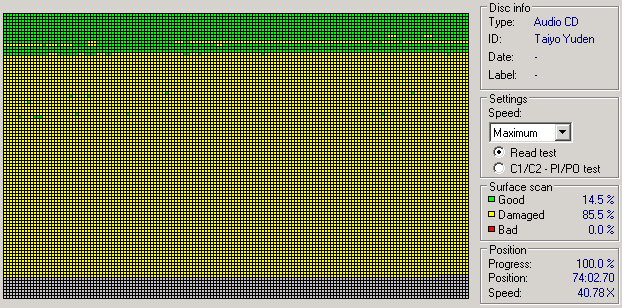
CD Speed - ScanDisc
The DVR-2920Q didn't handle scratched discs as well as some of the other DVD writers we've looked at recently. While there weren't any unreadable sectors on the disc, the drive considered more than 85% of the CD to be "damaged."
You can also get an idea of how well the drive can read scratched and dirty discs by using CD DAE. The application extracts the audio tracks twice and then compares them. From this information we can see what the drive's average speed was and how many errors it generated.
| CD DAE | Avg. Speed | Errors | % of Disc |
|
Pioneer DVR-2920Q |
24.2x | 47506261 | 6.06% |
|
Pioneer DVR-116D |
25.3x | 99768247 | 12.73% |
|
Samsung SH-S203N |
29.0x | 2365653 | 0.30% |
The DVR-2020Q gave us some mixed results in this test. While the scratches on the disc had little effect on the drive's speed, the number of errors was a little higher than what I'd like to see.
CD Write and ReWrite Tests - Nero Burning Rom 7.11.10.0 and DLA 5.20:
For this test I randomly generated 700MB of files and directories to test the time it takes the drive to write and close a CD. All of the files are between 1MB and 25MB in size and no more than 10 directories deep. All of the times below include not only the actual writing time, but the lead in and out times too. This gives a more realistic idea of how long it takes to write a CD.
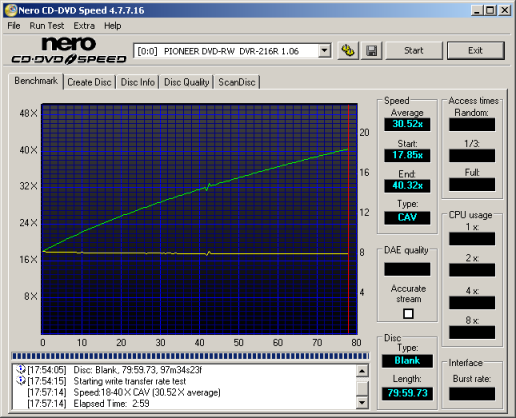
The DVR-2920Q has a maximum CD writing speed of 40x. To reach this speed, it uses CAV, or Constant Angular Velocity. With Verbatim's 52x media, the drive started writing at about 17.85x and reached a maximum speed of 40.32x at the end of the session. This gave Pioneer's new DVD±RW drive an average writing speed of about 30.52x.
To test the drive's writing times, I wrote our test data to some Verbatim media rated at 52x. The results are below.
| Size in MB | Size in Time | Pioneer DVR-2920Q |
Pioneer DVR-116D |
Optiarc AD-7200S |
Samsung SH-S203N |
| 701MB | 79:44:21 | 3:33 | 3:33 | 3:12 | 2:55 |
Pioneer's new DVD writer went into this test with a slight disadvantage. While the drives from Optiarc and Samsung can write CD's at 48x, the DVR-2020Q has a maximum writing speed of only 40x. Nevertheless, it was able to write an entire 701MB CD in a respectable 3:33.
To test the drive's writing quality I used Lite-On IT's KProbe2. Written by Karr Wang, this utility can be used to test the number of C1 and C2 errors on a disc. For these tests I used a Lite-On LTR-52246S (firmware 6S0F) and read the discs at 32x.
The DVR-2920Q's writing quality was very good. By looking at the KProbe screenshots, you can see that the discs burned by the drive had a low number of C1 errors and there were no C2 errors at all.
For the rewriting tests I created 400MB of files on the hard drive and wrote them in DAO mode using Nero. To test the packet writing speeds I copied and pasted the same files off the hard drive onto a CD-RW disc using DLA from Sonic. Verbatim's 32x Ultra Speed CD-RW media was used for these tests.
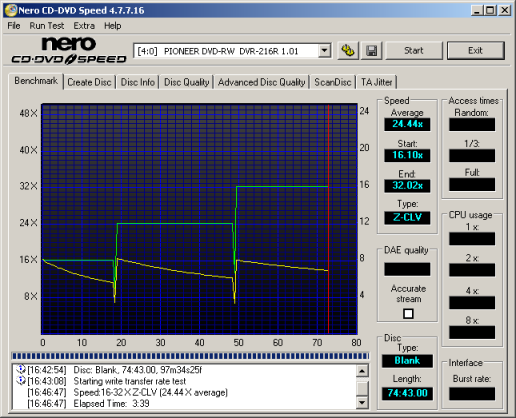
While the DVR-2920Q uses CAV when writing to CD-R discs, it uses Z-CLV, or Zone CLV, when rewriting at 32x. By looking at the screenshot above, you can see that it starts writing at 16x and jumps to 24x at about the 19 minute mark. The drive writes at this speed until about the 49 minute mark. At this point, the writing speed increases to 32x and stays there until the very end of the session.
| Software | Pioneer DVR-2920Q |
Pioneer DVR-116D |
Optiarc AD-7200S |
Samsung SH-S203N |
| Nero | 2:53 | 2:55 | 2:11 | 2:22 |
| DLA Write | 2:39 | 2:46 | 2:17 | 3:26 |
| DLA Read | 1:08 | 6:02 | 1:36 | 1:16 |
Pioneer's new DVD writer didn't do as well as some of the other drives in our rewriting tests. Due to its Z-CLV writing method, the DVR-2920Q took 2:53 to write 400MB with Nero and 2:39 to do the same with DLA.
| Pioneer DVR-2920Q |
Pioneer DVR-116D |
Optiarc AD-7200S |
Samsung SH-S203N |
|
| Quick Erase | 28 seconds | 26 seconds | 16 seconds | 18 seconds |
| Full Erase | 3:52 | 3:49 | 3:06 | 3:14 |
The DVR-2920Q's Z-CLV writing method also put it at a disadvantage when erasing. The drive not only had the highest quick erase time, it took nearly four minutes to do a full erase.
Nero CD Speed v4.7.7.7 - DVD-ROM:
For this test I used a single layer, single sided data DVD-ROM disc that is 4.37GB in size.
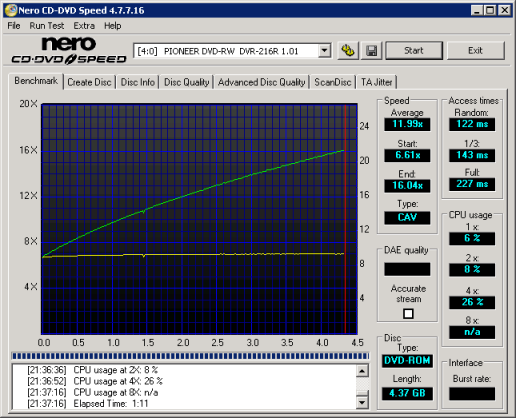
| Pioneer DVR-2920Q |
Pioneer DVR-116D |
Optiarc AD-7200S |
Samsung SH-S203N |
|
| Transfer Speed Average: Start: End: |
11.99x 6.61x 16.04x |
12.01x 6.61x 16.04x |
12.03x 6.61x 16.09x |
12.14x 6.70x 16.20x |
| Seek Times Random: 1/3: Full: |
122ms 143ms 226ms |
118ms 134ms 218ms |
124ms 141ms 226ms |
97ms 113ms 184ms |
| CPU Usage 1x: 2x: 4x: 8x: |
6% 8% 26% n/a |
7% 8% 28% n/a |
11% 9% 16% 29% |
9% 6% 10% 19% |
The DVR-2020Q was fairly quick when reading single layer DVD-ROM's. In our tests it started reading at 6.61x and reached a maximum transfer speed of 16.04x. Unfortunately, its seek times were not nearly as low as the drive from Samsung.
Nero CD Speed v4.7.7.7 - DVD-R, DVD-RW and DVD-RAM:
First, we'll look at the drive's DVD-R and DVD-RW reading performance. For this I made copies of our DVD-ROM test disc using some general use 8x DVD-R and 6x DVD-RW media from Verbatim and then ran our usual DVD read tests with CD Speed. For the DVD-RAM tests, media from Maxell was used. The results are below.
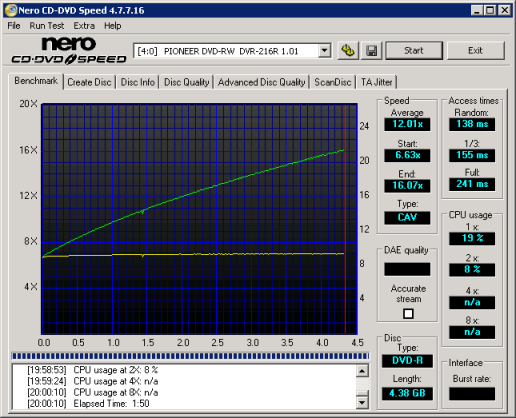
Verbatim DVD-R
| Pioneer DVR-2920Q |
Pioneer DVR-116D |
Optiarc AD-7200S |
Samsung SH-S203N |
|
| Transfer Speed Average: Start: End: |
12.01x 6.63x 16.07x |
12.02x 6.69x 16.01x |
12.07x 6.62x 16.13x |
12.15x 6.71x 16.25x |
| Seek Times Random: 1/3: Full: |
139ms 155ms 240ms |
136ms 152ms 243ms |
125ms 153ms 245ms |
114ms 127ms 203ms |
| CPU Usage 1x: 2x: 4x: 8x: |
19% 8% n/a n/a |
19% 8% n/a n/a |
13% 16% 24% 33% |
11% 6% 11% 23% |
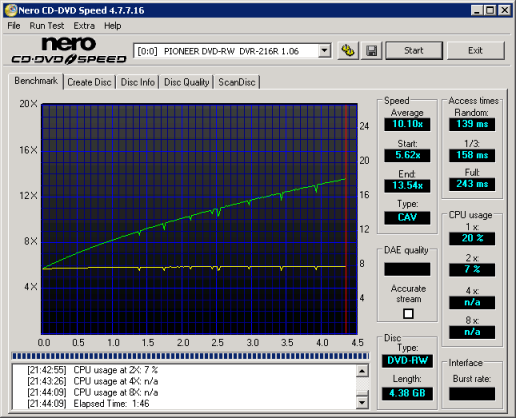
Verbatim DVD-RW
| Pioneer DVR-2920Q |
Pioneer DVR-116D |
Optiarc AD-7200S |
Samsung SH-S203N |
|
| Transfer Speed Average: Start: End: |
10.10x 5.62x 13.54x |
10.10x 5.65x 13.50x |
9.78x 5.36x 13.07x |
9.03x 4.97x 12.08x |
| Seek Times Random: 1/3: Full: |
140ms 158ms 242ms |
137ms 163ms 237ms |
123ms 156ms 252ms |
122ms 130ms 209ms |
| CPU Usage 1x: 2x: 4x: 8x: |
20% 7% n/a n/a |
19% 8% n/a n/a |
5% 10% 17% 30% |
9% 6% 11% 19% |
The DVR-2020Q performed very well when reading DVD-R and DVD-RW media. In our tests, the drive read DVD-R discs at 16x and DVD-RW media at a respectable 13x.
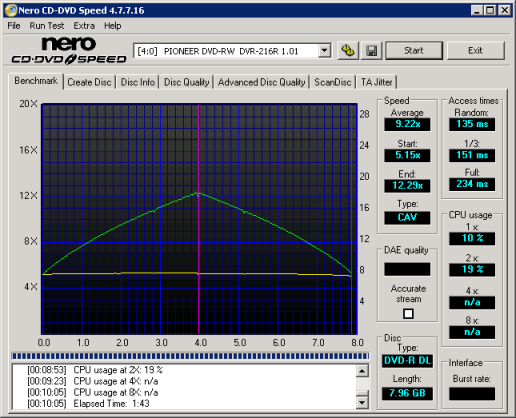
Verbatim DVD-R DL
| Pioneer DVR-2920Q |
Pioneer DVR-116D |
Optiarc AD-7200S |
Samsung SH-S203N |
|
| Transfer Speed Average: Start: End: |
9.22x 5.15x 12.29x |
9.22x 5.15x 12.29x |
8.91x 4.93x 11.87x |
9.23x 5.12x 12.30x |
| Seek Times Random: 1/3: Full: |
135ms 150ms 235ms |
142ms 165ms 232ms |
142ms 164ms 253ms |
125ms 140ms 213ms |
| CPU Usage 1x: 2x: 4x: |
10% 19% n/a |
11% 18% n/a |
5% 8% 14% |
12% 8% 15% |
Pioneer's new drive had no problems reading Verbatim's 4x DVD-R DL media. The DVR-2020Q started reading at 5.15x and reached a maximum transfer speed of 12.29x.
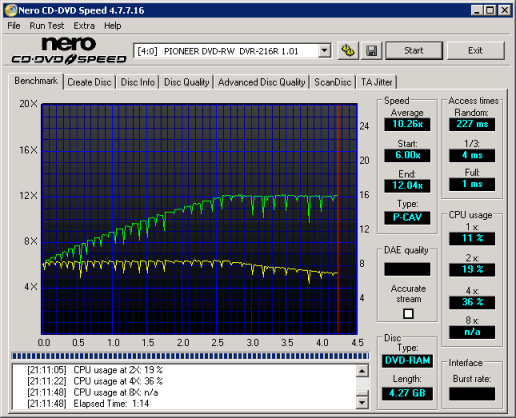
Maxell 12x DVD-RAM
| Pioneer DVR-2920Q |
Pioneer DVR-116D |
Optiarc AD-7200S |
Samsung SH-S203N |
|
| Transfer Speed Average: Start: End: |
10.26x 6.00x 12.04x |
4.92x 4.30x 4.98x |
10.06x 5.91x 11.99x |
10.19x 5.93x 12.02x |
| Seek Times Random: 1/3: Full: |
223ms 4ms 1ms |
191ms 2ms 6ms |
205ms 251ms 274ms |
147ms 152ms 245ms |
| CPU Usage 1x: 2x: 4x: 8x: |
11% 19% 36% n/a |
13% 22% 45% n/a |
13% 12% 18% n/a |
9% 10% 12% 20% |
Pioneer's new drive has a maximum transfer speed of 12x when reading DVD-RAM discs. By looking at the screenshot you can see that it starts reading at 6.00x and accelerates, reaching 12x at the 2.6GB mark. For whatever reason, the 1/3 and full seek times were much lower than they should have been.
Nero CD Speed v4.7.7.7 - DVD+R and DVD+RW:
Next we'll look at the drive's DVD+R and DVD+RW reading performance. For this I made a copy of our DVD-ROM test disc using some 8x DVD+R and 8x DVD+RW media from Verbatim. I then ran our usual DVD read tests with CD Speed. The results are below.
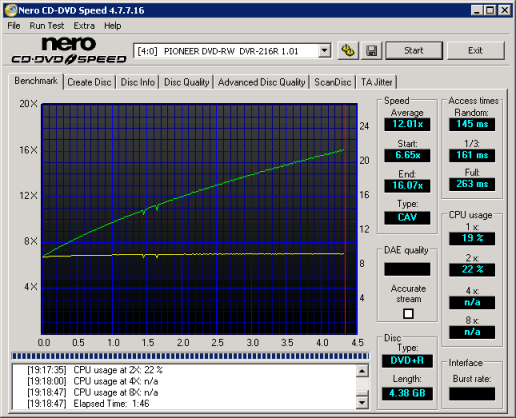
Verbatim DVD+R
| Pioneer DVR-2920Q |
Pioneer DVR-116D |
Optiarc AD-7200S |
Samsung SH-S203N |
|
| Transfer Speed Average: Start: End: |
12.01x 6.65x 16.07x |
12.03x 6.63x 16.06x |
12.06x 6.63x 16.12x |
12.14x 6.71x 16.23x |
| Seek Times Random: 1/3: Full: |
146ms 163ms 263ms |
143ms 160ms 259ms |
124ms 150ms 246ms |
125ms 129ms 211ms |
| CPU Usage 1x: 2x: 4x: 8x: |
19% 22% n/a n/a |
18% 22% n/a n/a |
11% 10% 16% 29% |
13% 11% 20% 34% |
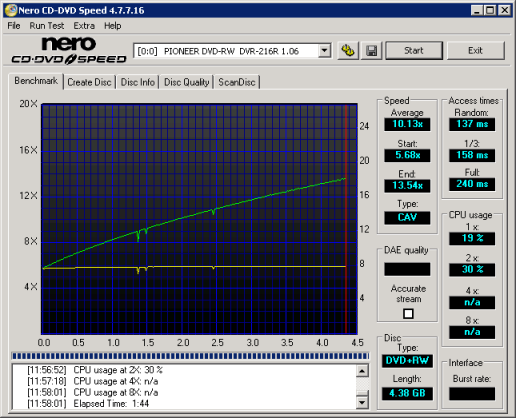
Verbatim DVD+RW
| Pioneer DVR-2920Q |
Pioneer DVR-116D |
Optiarc AD-7200S |
Samsung SH-S203N |
|
| Transfer Speed Average: Start: End: |
10.13x 5.68x 13.54x |
10.14x 5.64x 13.52x |
9.79x 5.39x 13.08x |
9.03x 4.98x 12.07x |
| Seek Times Random: 1/3: Full: |
139ms 157ms 239ms |
137ms 152ms 240ms |
123ms 153ms 248ms |
124ms 134ms 202ms |
| CPU Usage 1x: 2x: 4x: 8x: |
19% 49% n/a n/a |
18% 23% n/a n/a |
5% 9% 16% 29% |
9% 6% 11% 19% |
The DVR-2020Q's performance with DVD+R and DVD+RW media was very similar to what we saw with DVD-R and DVD-RW media. The drive read DVD+R discs at 16x and DVD+RW media at 13x.
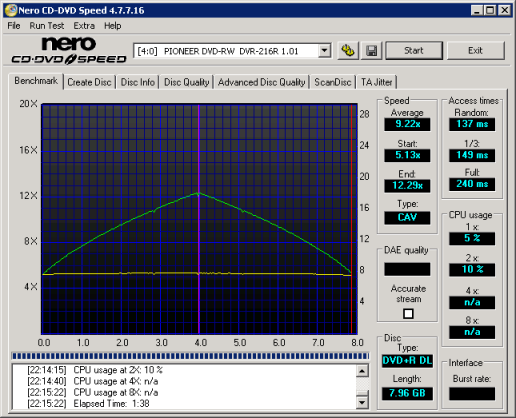
Verbatim DVD+R DL
| Pioneer DVR-2920Q |
Pioneer DVR-116D |
Optiarc AD-7200S |
Samsung SH-S203N |
|
| Transfer Speed Average: Start: End: |
9.22x 5.13x 12.29x |
9.23x 5.14x 12.29x |
8.91x 4.93x 11.87x |
9.22x 5.12x 12.30x |
| Seek Times Random: 1/3: Full: |
136ms 149ms 238ms |
139ms 150ms 237ms |
127ms 153ms 251ms |
131ms 146ms 213ms |
| CPU Usage 1x: 2x: 4x: |
5% 10% n/a |
8% 8% n/a |
5% 7% 13% |
12% 8% 15% |
Reading Verbatim's double layer DVD+R media wasn't a problem for the DVR-2020Q either. The drive started reading at 5.13x and reached a maximum transfer speed of 12.29x.
Nero CD Speed v4.7.7.7 - DVD-Video:
For these tests I am using the US version of Transformers: The Movie on DVD. The disc is over 4GB and single sided.
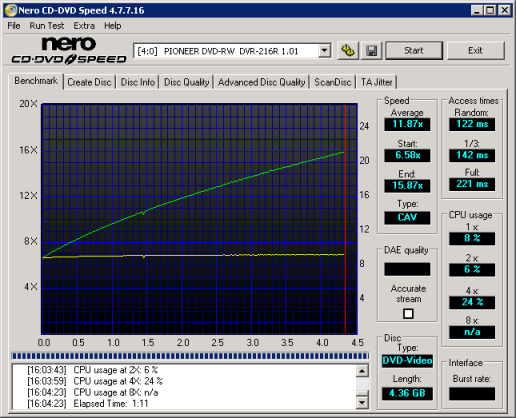
| Pioneer DVR-2920Q |
Pioneer DVR-116D |
Optiarc AD-7200S |
Samsung SH-S203N |
|
| Transfer Speed Average: Start: End: |
11.87x 6.58x 15.87x |
11.88x 6.54x 15.88x |
11.91x 6.54x 15.93x |
12.00x 6.63x 16.04x |
| Seek Times Random: 1/3: Full: |
123ms 143ms 222ms |
116ms 131ms 214ms |
123ms 146ms 225ms |
95ms 112ms 183ms |
| CPU Usage 1x: 2x: 4x: 8x: |
8% 6% 24% n/a |
9% 7% 23% n/a |
11% 9% 16% 29% |
9% 6% 10% 21% |
The DVR-2020Q didn't slow down very much when reading single layer DVD videos. It started out at about 6.58x and reached a maximum read speed of 15.87x. Pioneer's new drive was also fairly quick when reading dual layer discs. By looking at the screenshot below, you can see that the drive's transfer speeds peaked at about 9x.
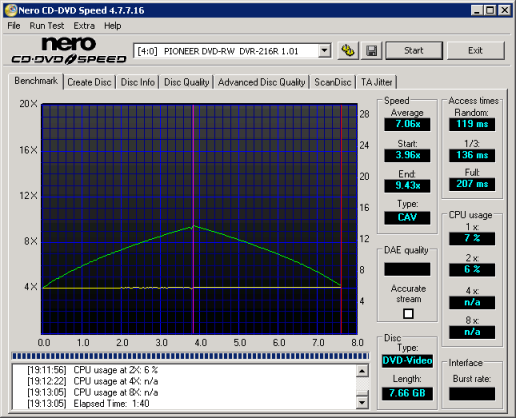
To see how well the DVR-2920Q worked as a DVD player, I watched a few scenes from Transformers: The Movie and Star Wars: The Phantom Menace using Nero Showtime. The drive had no problems playing back these movies with either program and was fairly quiet.
DVD Write and ReWrite Tests - Nero Burning Rom 7.11.10.0 and DLA 5.20:
To test the DVD writing performance of Pioneer's new drive I used Verbatim 16x DVD+R, Verbatim 16x DVD-R, RiDATA 8x DVD+RW and Verbatim 6x DVD-RW media. To get the writing times, a 4.38GB image was burned to our test discs using Nero.
|
|
When writing to DVD+R and DVD-R media at 20x, the DVR-2020Q uses CAV. By looking at the screenshots above, you can see that Pioneer's new drive starts writing at about 7.7x and accelerates, reaching its maximum speed at the end of the disc.
The DVR-2020Q also features 8x DVD+RW and 6x DVD-RW writing speeds. While the drive uses CLV when writing to DVD-RW media, it uses Z-CLV to reach its maximum DVD+RW writing speed.
| Pioneer DVR-2920Q |
Pioneer DVR-116D |
Optiarc AD-7200S |
Samsung SH-S203N |
|
| DVD+R | 4:52 | 4:50 | 4:57 | 4:53 |
| DVD-R | 4:42 | 4:45 | 4:38 | 4:42 |
| DVD+RW | 7:23 | 7:24 | 7:28 | 7:29 |
| DVD-RW | 10:00 | 9:59 | 10:05 | 10:01 |
The DVR-2020Q performed very well in our DVD writing tests. While not as fast as some of the 22x DVD writers we've looked at recently, it turned in some impressive times with DVD±R and DVD±RW media.
While Pioneer has a list of supported media on its website, I wanted to see for myself how well the DVR-2020Q worked with some of the DVD+R and DVD-R discs available in my area. The media types, along with the average time it took the drive to write our 4.38GB image, are listed below. For these tests, Optimum Write Speed was left disabled.
| Manufacturer ID | Max Write Speed |
Average Write Time |
|
| Memorex 16x DVD+R | RICOHJPN R03 | 18x | 5:14 |
| Sony 16x DVD+R | SONYD21 | 18x | 5:15 |
| Taiyo Yuden 16x DVD+R | YUDEN000T03 | 20x | 4:49 |
| Verbatim 16x DVD+R | MCC-004 | 20x | 4:52 |
| RiDATA 16x DVD-R | RITEKF1 | 18x | 5:12 |
| Sony 16x DVD-R | SONY16D1 | 18x | 5:14 |
| Taiyo Yuden 16x DVD-R | TYG03 | 20x | 4:51 |
| Verbatim 16x DVD-R | MCC 03RG20 | 20x | 4:48 |
So what about writing quality? Thanks to KProbe, we can test a disc's PI (Parity Inner) and PIF (Parity Inner Fail) rates. For these tests I used a Lite-On SHM-165H6S (firmware HS0E) and read the discs at 4x with the PI and PIF ECC sums set to 8 and 1 respectively. For comparison, I also tested the discs on a BenQ DW1640. When combined with Nero CD Speed, the DW1640 is able to report PI Errors, PI Failures, Parity Outer Failures and even jitter levels. For this test, the discs are read at 8x with both the PI and PIF ECC sums set to 8.
So what are "good" results supposed to look like? With KProbe, the PI errors should not exceed 280 and the number of PIF errors should stay below 4. When testing with CD Speed, the number of PI errors should stay below 280 as well. However, because it scans with an ECC sum of 8, a higher number of PIF errors is acceptable, as long as they do not exceed 32. Since POF errors are uncorrectable, we really don't want to see any of them at all.
I also put these discs through a "stress test" by reading them back at 16x with the DW1640. By reading these discs back at this speed, we can see if there are any readability issues caused by the number of errors or high levels of jitter.
The DVR-2920Q's writing quality was pretty good with most of the DVD+R media we tested. Aside from a few isolated spikes, the PI/PIF rates stayed within acceptable limits. The only real exception was Memorex's 16x DVD+R media. When tested with KProbe and CD Speed, the PI rate was pretty high near the end of the disc.
Lastly, here are some results from our DVD-R test media. While the writing quality varied from one manufacturer to another, the results were pretty good for the most part.
| Pioneer DVR-2920Q |
Pioneer DVR-116D |
Optiarc AD-7200S |
Samsung SH-S203N |
|
| DVD+RW Quick | 4 seconds | 6 seconds | 4 seconds | 3 seconds |
| DVD+RW Full | 7:46 | 7:21 | 7:28 | 7:28 |
| DVD-RW Quick | 21 seconds | 25 seconds | 29 seconds | 28 seconds |
| DVD-RW Full | 9:46 | 9:56 | 9:55 | 9:56 |
To test the DVR-2020Q's packet writing performance I used DLA 5.20. RiDATA 8x DVD+RW, Verbatim 6x DVD-RW and Maxell 12x DVD-RAM media were used once again.
| Pioneer DVR-2920Q |
Pioneer DVR-116D |
Optiarc AD-7200S |
Samsung SH-S203N |
|
| DVD+RW Write | 6:33 | 6:36 | 6:41 | 6:42 |
| DVD+RW Read | 8:30 | 8:33 | 5:49 | 6:11 |
| DVD-RW Write | 8:25 | 8:23 | 8:26 | 8:26 |
| DVD-RW Read | 8:31 | 8:32 | 5:55 | 6:13 |
| DVD-RAM Write | 15:13 | n/a | 13:54 | 12:53 |
| DVD-RAM Read | 5:28 | n/a | 5:36 | 6:25 |
The DVR-2920Q's packet writing performance was pretty mixed. While it turned in some very good times when writing to DVD+RW and DVD-RW media, it wasn't as fast as the other drives when reading back our test data or when writing to DVD-RAM discs.
Double Layer DVD Write Tests - Nero Burning Rom 7.11.10.0:
To test the double layer DVD writing performance of the DVR-2920Q, I used DVD+R DL and DVD-R DL media from Verbatim and Memorex. I created about 8GB of random files and directories on my hard drive and then burned them to our test discs with Nero.
| Pioneer DVR-2920Q |
Pioneer DVR-116D |
Optiarc AD-7200S |
Samsung SH-S203N |
|
| DVD+R DL Write | 14:31 | 14:30 | 18:48 | 13:08 |
| DVD-R DL Write | 15:47 | 15:04 | 18:56 | 13:33 |
While the DVR-2920Q is capable of writing at 12x, its speed was limited to 10x with Verbatim's 8x DVD+R DL and DVD-R DL media. Nevertheless, the drive performed pretty well, taking 14:31 to write 8001MB of data to DVD+R DL media and 15:47 to do the same with DVD-R DL discs.
The writing quality was pretty good with Verbatim's 2.4x and Memorex's 8x DVD+R DL media. Aside from a few isolated spikes, the PI/PIF rates stayed within acceptable limits. Unfortunately, the results weren't as good with Verbatim's 8x DVD+R DL and DVD-R DL. When scanned with the BenQ DW1640, the error rates were fairly high throughout the second layer of the disc.
Performance Revisited:
Like Pioneer's previous DVD writers, the DVR-2920Q performed as expected throughout most of our tests. The drive had no problems holding its own in our DVD writing tests, turning some respectable times with DVD±R, DVD±RW and DVD±R DL media. Reading DVD's wasn't a problem for Pioneer's new Qflix-enabled drive either. The DVR-2920Q was able to read single layer data DVD's and DVD±R media at 16x and DVD±RW media at a respectable 13x.
The DVR-2020Q also did relatively well in our CD read tests. While not as fast as the other drives, it had no problems reading all types of media at its rated speeds. When it came to writing CD's, the DVR-2020Q's 40x CD-R writing speed put it at a slight disadvantage. Nevertheless, its writing quality was very good. With all things considered, the Pioneer DVR-2920Q gets a solid 7 out of 10 for the performance section of this review.
Over the last year or so, we've had a number of Pioneer's DVD writers drives in the 'Labs. Offering a good mix of performance and features, these drives have become the choice of enthusiasts as well as some of our favorites. With the DVR-2920Q, Pioneer has partnered with Sonic to introduce one of the Qflix enabled DVD writers. With this new technology, consumers can download movies from CinemaNow and burn them to DVD for playback on standard DVD players.
The DVR-2920Q performed very well when writing to DVD+R and DVD-R media at 20x. At this speed, it took less than five minutes to write an entire 4.7GB DVD. The drive also did pretty well in our rewriting tests, turning in some respectable times with DVD-RW and DVD+RW media. Without compatible media, we weren't able to test the DVR-2920Q's full potential when writing to DVD±R DL media. However, when writing at 10x, the drive took about 15 minutes to burn 8GB of data.
When it came to media compatibility, the DVR-2920Q gave us some mixed results. While the drive wrote to all of our test media at its rated speeds or better, only four types were supported at 20x. On the other hand, the DVR-2920Q's writing quality was fairly good, at least with single layer DVD±R media. With DVD±R DL media though, there were a couple of cases where the PI/PIF rates were higher than we'd like to see. Hopefully, Pioneer can address this in a future firmware update.
The DVR-2920Q also performed fairly well in our DVD read tests. While its seek times were a little higher than I would have liked, it was able to read single layer DVD-ROM's and DVD±R media at 16x. The DVR-2920Q also reached some pretty impressive transfer speeds with other types of DVD media. In our tests, it read DVD±RW discs at 13x and both DVD±R DL and DVD±RAM media at 12x.
While not as fast as some of the other drives, the DVR-2920Q performed as expected when reading CD's. In our tests, the drive read pressed and CD-R media at 41x and CD-RW discs at 33x. Pioneer's new drive also did fairly well when ripping audio CD's, reaching DAE speeds as high as 41x. Writing CD's wasn't a problem for the DVR-2920Q either. The drive's 40x CD-R writing speed did put it at a disadvantage in some of our tests. However, its writing quality was very good.
Like Pioneer's previous DVD writers, the DVR-2920Q isn't short on features. To prevent buffer underruns, it has a 2000KB buffer that is backed up by some sort of buffer underrun technology. While this buffer is a little smaller than we'd like to see on a 20x DVD writer, this system worked flawlessly in our tests. The DVR-2920Q also features an anti-dust design with noise reducing mechanisms and support for Pioneer's new Optimal Write Speed technology. Unfortunately, the drive's bitsetting capabilities are fairly limited. While the DVR-2920Q automatically sets the book type to "DVD-ROM" when writing to DVD+R DL discs, it lacks the ability to do the same with single layer DVD+R and DVD+RW media.
Of course, the DVR-2920Q's biggest feature is its support for Sonic’s Qflix technology. Using the bundled software, consumers can purchase movies online from CinemaNow, download them to their computer and then burn them to DVD. Sonic and Pioneer have obviously put a lot of effort into this technology as it worked flawlessly in our tests. Nevertheless, I was a little turned off by the limited selection of titles as well as the amount of time it took to download and burn the movie to disc. This may not bother those already purchasing movies online. However, it's going to be hard to convince consumers to go the Qflix route instead of buying their DVDs at retail stores.
The DVR-2920Q is available now and can be purchased through some of the online vendors found on Pricegrabber. Prices vary depending on the seller, but Pioneer's new Qflix enabled DVD writer can be picked up for less than $60.
| Pioneer DVR-2920Q 20x DVD±RW/RAM |
|
| Features: Installation: Performance: |
8 8 7 |
| Overall: | 8 |
Highs:
- Supports Qflix technology
- Writes to DVD-R and DVD+R media at 20x
- Writes to DVD+R DL and DVD-R DL media at 12x
- Writes to DVD+RW media at 8x
- Writes to DVD-RW media at 6x
- Writes to CD-RW media at 32x
- Reads single layer DVD-ROM's at 16x
- Reads DVD±R media at 16x
- Reads DVD±RW media at 13x
- Reads DVD±R DL media at 12x
- Reads and writes DVD-RAM media at 12x
- Good selection of writing and rewriting speeds
- Includes buffer underrun prevention technology
- Good CD-R writing quality
- Features Pioneer's Optimum Write Speed technology
- Supports bitsetting for DVD+R DL media
Lows:
- Questionable writing quality with some DVD+R and DVD±R DL media
- Reads CD-ROM's and CD-R media at only 40x
- Writes to CD-R media at only 40x
- Cannot set the book type of DVD+R or DVD+RW media
- Overburns to only 94:27
